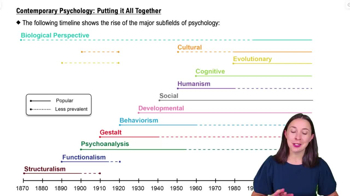Table of contents
- 1. Introduction to Psychology1h 43m
- 2. Psychology Research2h 20m
- 3. Biological Psychology2h 41m
- 4. Sensation and Perception28m
- 5. Consciousness and Sleep32m
- 6. Learning41m
- 7. Memory34m
- 8. Cognition37m
- 9. Emotion and Motivation35m
- 10. Developmental Psychology33m
- 11. Personality48m
- 12. Social Psychology41m
- 13. Stress and Health41m
- 14. Psychological Disorders44m
- 15. Treatment47m
1. Introduction to Psychology
Contemporary Psychology: Putting it All Together
Struggling with Psychology?
Join thousands of students who trust us to help them ace their exams!Watch the first videoMultiple Choice
Since birth, Jared has experienced a disturbing twitch that interferes with his ability to function. Through careful observation, it was discovered that Jared's uncontrollable behavior may be the result of a genetic predisposition. The psychological perspective that correlates best with this finding is
A
behaviorism
B
cognitive psychology.
C
biopsychology.
D
evolutionary psychology.
 Verified step by step guidance
Verified step by step guidance1
Identify the key issue in the problem: Jared has a twitch that is interfering with his ability to function.
Recognize that the problem suggests a genetic predisposition as a potential cause for Jared's behavior.
Understand that the psychological perspective that focuses on the biological and genetic influences on behavior is biopsychology.
Differentiate between the given options: behaviorism focuses on observable behaviors and their environmental determinants, cognitive psychology focuses on mental processes, and evolutionary psychology considers how evolutionary principles influence behavior.
Conclude that biopsychology is the most relevant perspective because it directly addresses the genetic and biological factors influencing behavior, which aligns with the problem's suggestion of a genetic predisposition.

 4:54m
4:54mWatch next
Master Contemporary Psychology with a bite sized video explanation from Hannah Gordils
Start learningRelated Videos
Related Practice




















